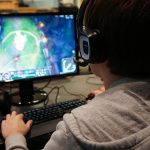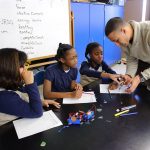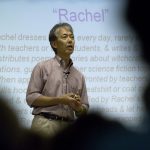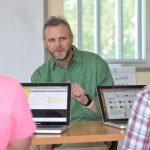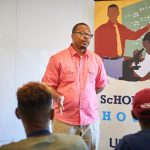Half of Hartford’s schoolkids attend integrated schools, thanks to a legal strategy that might work elsewhere. Here, doctoral student Robert Cotto is interviewed on the desegration case Sheff v. O’Neill. “Choice Watch,” a report he published in 2014, is also cited.
Sports activism has become an increasingly controversial topic in news media, with many people both for and against the peaceful protests done by NFL players. In response to this, UConn Athletics, Sport Management Program and Collective Uplift co-sponsored the Race, Sport and Activism Panel. The purpose of this panel, moderated by Dr. Joseph Cooper, was to give student athletes a chance to discuss the subjects of race, sport and activism.
In their recently published edited volume, Exploding the Castle: Rethinking How Video Games and Game Mechanics Can Shape the Future of Education (Information Age, 2017), Neag School faculty Michael Young and Stephen Slota — both longtime video game devotees — explore the value of games, the role of games in the future of K-12 and higher education, and more. Here, Young, associate professor of cognition, instruction, and learning technology, and Slota, assistant professor-in-residence of educational technology discuss the book and share their insights on the intersection between games, technology, and learning.
Led by educational psychology professors in the Neag School of Education, two research projects have recently been awarded a total of nearly $5 million in federal funding, made available through the Jacob K. Javits Gifted and Talented Students Education Act.
Co-written by George Sugai, Neag School professor of special education, and Geoff Colvin, a retired research associate in the University of Oregon’s College of Education, this piece was originally published in the “Guest Viewpoint” section of The Register-Guard, a local newspaper based in Eugene, Ore.
Todd Cambpell, professor of science education, has been named editor of the Journal of Science Teacher Education, the flagship journal of the Association for Science Teacher Education.
In much later years I came across the writings of Joseph Renzulli, professor of educational psychology at the University of Connecticut. Renzulli proposes three criteria for the identification of genuine “giftedness”: intelligence, creativity and perseverance.
Mentors and guidance counselors helped Erik Hines, an assistant professor of educational psychology, find his path. Now he is paying it forward.
As faculty director of the new learning community ScHOLA²RS House, Erik Hines hopes to gain a deeper understanding of the variables that influence positive academic and career outcomes for black males, the subject at the heart of both his day-to-day counseling work and his academic research. (ScHOLA²RS stands for Scholastic House of Leaders in Support of African-American Researchers & Scholars)
The Global Sports Mentoring Program (GSMP)’s Empower Women Through Sports Initiative is an international initiative co-sponsored by the U.S. Department of State and espnW that partners emerging female leaders from 17 countries with leading executives and experts in the U.S. sports industry. For the second consecutive year, Neag School faculty members Jennie McGarry and Laura Burton will be serving in the coming weeks as hosts.
